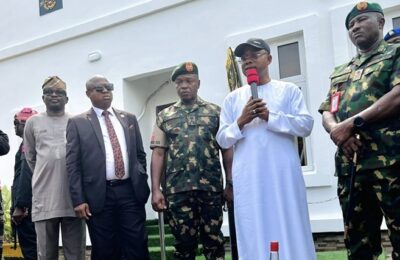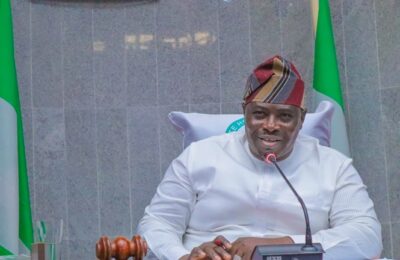By Taiye Agbaje.
There was a mild drama at the Federal High Court in Abuja on Thursday, as Kemi Pinheiro, SAN, counsel to the Economic and Financial Crimes Commission (EFCC), described the charge preferred against former Gov. Yahaya Bello as “a political case.”
Pinheiro stated this while arguments were being raised before Justice Emeka Nwite on whether the defence lawyer, Joseph Daudu, SAN, could cross-examine the 4th prosecution witness (PW-4) shortly after the conclusion of evidence-in-chief or wait till Friday.
While describing the importance of the case and the need to expedite proceedings, the anti-graft lawyer said it was the trial of a former governor of a state, hence, political.
However, Daudu responded that the matter was not political one but a trial on allegations bordering on money laundering.
Pinheiro insisted it was political, emphasising that he was not prosecuting a bank official, but a political figure, “one who had even aspired to contest for presidency.”
“Political? If that is the case, then those handling political cases should prepare to take over the matter,” Justice Nwite said jokingly.
Earlier, the judge, in a ruling, rejected the application by the EFCC to “cross-examine” its own witness in the ongoing money laundering trial of ex-Gov. Bello.
Justice Nwite stated that there was no provision in law that permits the court to allow the prosecution to re-examine its witness in the manner proposed.
It would be recalled that the lawyer who appeared for the EFCC in the last adjourned date, Olukayode Enitan, SAN, had sought to “cross-examine” their 3rd prosecution witness (PW-3), Mr Nicholas Ojehomon, an Internal Auditor with American International School, Abuja (AISA).
The request was made after Daudu concluded his cross examination of Ojehomon.
Daudu had asked specific questions regarding the judgment of the FCT High Court which was admitted in evidence as Exhibit 19 by the judge during the cross-examination.
Shortly after the cross-examination, Justice Nwite had asked Enitan if he would re-examine the witness.
Enitan, however, informed the court that he planned to also cross-examine Ojehomon based on the Exhibit 19.
He told the court that he was not re-examining the PW-3, but cross-examining him on the document admitted in evidence during cross examination by the defence but the defence counsel opposed the request and the matter was adjourned for ruling.
Delivering the ruling, Justice Nwite agreed with Daudu’s argument that the prosecution could only be allowed to cross-examine its witness after it must have declared it’s own witness as “hostile witness.”
“The argument of the learned counsel to the prosecution is misconceived,” he said.
According to the judge, this honourable court is not shutting the prosecution from re-examining the witness, but must restrict itself to Pages 1, 14 and 15 of Exhibit 19.
“The prosecution is not allowed to re-examine the witness outside the pages prescribed,” he said.
Ojehomon had, on May 9, said there was no wired transfer of fees from the Kogi State Government or any of the local governments’ account in the state to the account of the American school.
On cross-examination, he also read out part of a previous FCT High Court’s judgment that said there was no court order for AISA to return fees to EFCC or any judgment declaring the money as proceeds of money laundering.
After the ruling, Pinheiro called the 4th prosecution witness (PW-4), Mshelia Arhyel Bata, a compliance officer with Zenith Bank.
The witness, while being led in evidence by Pinheiro, confirmed that certificates of identification were attached to the statements of account provided by the bank in the seven set of documents presented, as requested.
The court, thereafter, admitted the statements of account of Kogi State Government House Administration, and six others, as exhibits.
The witness, who was on subpoena, explained to the court on the withdrawal limits allowed for individuals, corporate organisations and government.
He said that before the cashless policy, it was pegged at N10 million for government.
The prosecution then took him to the May 23, 2016 on the printed documents, and pointed at a transaction under the name, Abdulsalami Hudu.
When the witness was asked to explain the transaction, he said, “It is a cash withdrawal of N10 million in accordance with the then maximum threshold allowed for cheque withdrawal per transaction.”
He, however, said he had nine cash transactions on the same date.
The witness was then told to go to the credit transactions of January 30, 2018, and he confirmed that there were 10 separate credits of various sums, totalling about N1.092 billion.
When asked to mention the total amount of withdrawals, the defendant’s counsel cut in, saying, “He (Pinheiro, SAN), knows that they are for security votes.”
The witness aggregated the total amount of withdrawals to N1.968 billion, saying they were on different dates. He also read out the inflow and outflow between May 2, 2018 and May 19, 2018.
After the examination by the prosecution, the judge adjourned the matter until June 27 for cross-examination.
(NAN)




